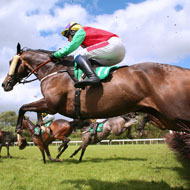
FEI secretary general.
Poppy seed contamination suspected
Three Swiss Jumping horses have tested positive for prohibited substances, the International Federation for Equestrian Sports (FEI) has announced.
Samples taken at La Boule in May from the horses Nino des Buissonnets and Nasa, both ridden by Olympic champion Steve Guerdat, tested positive for the banned substance codeine and the controlled substance, morphine.
Both horses also revealed traces of the banned substance oripavine, however there was not enough in Nasa's sample to declare a positive.
In the same month, samples taken in Deauville from the horse Charivari KG, ridden by Alessandra Bichsel, also returned positive for codeine, oripavine and morphine.
Under the FEI's Equine Anti-Doping and Controlled Medication Regulations, Steve Guerdat and Alessandra Bichsel have been provisionally suspended, and the three horses have been provisionally suspended for two months. The FEI will offer the athletes and the horse owners the opportunity for a preliminary hearing before the FEI Tribunal to request the lifting of the provisional suspensions.
FEI secretary general Sabrina Zeender said: “The presence in all these samples of oripavine, which is not found in any veterinary products, suggests that this could be contamination, but obviously we still have to follow standard procedure”
“The combination of oripavine, morphine and codeine have frequently been seen in contamination cases from other equestrian sport regulators, and the FEI already has three outstanding cases from 2014 involving oripavine and morphine in which we proactively sought the lifting of the provisional suspensions. As the regulator of international equestrian sport, we have to balance fairness to the athletes with our dual role of protecting horse welfare and maintaining a level playing field.”
Oripavine is an analgesic that is not used clinically due to it being extremely toxic and having a very narrow therapeutic margin. Positive results are often the result of the ingestion of poppy seeds. Codeine and morphine, which are both also found in poppy seeds, are also analgesics.
Because of the evidence of poppy seed contamination resulting in positives, the FEI downgraded morphine from a banned substance to a controlled medication in 2013. Codeine is listed for a similar downgrading when proposed changes to the Equine Prohibited Substances List comes into effect on 1 January 2016.



 The RCVS has announced a new version of its 1CPD mobile app, with enhanced features for veterinary surgeons and veterinary nurses to record their continuing professional development.
The RCVS has announced a new version of its 1CPD mobile app, with enhanced features for veterinary surgeons and veterinary nurses to record their continuing professional development.